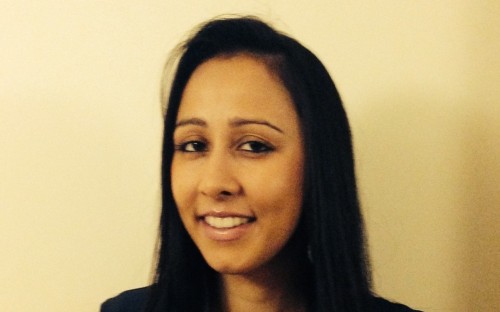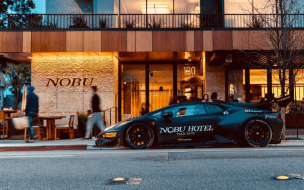“I have a computer science degree,” laughs Ashuveen, who set-up a mobile app business in June last year. “When people meet me now, they think I’m a salesman. But it is still in me. I know all about programming.”
Ashuveen, a Londoner who studied an EMBA at Cass Business School and spent ten years in the insurance sector, makes for an unlikely technology evangelist.
But it is helpful to keep one foot in the tech door. It has been valuable to help build her businesses infrastructure, and to “know what is going on”.
Her IT architect, she says, is a genius – but as the CEO of Drinqsmart Ltd, she must keep a handle on all aspects of the company.
Drinqsmart, a mobile app, combines social and geo-location technology to offer a way for users to stay connected with friends, meet for drinks with ease and take advantage of the hottest venue promotions.
The business sells online platforms to bars and pubs across London that want to join the network. In return, venues can send out real-time promotions to potential customers whom are nearby.
Ashuveen is quick to point out that they won’t reveal users’ exact locations – rather a rough area. “Mostly tied to tube stations,” she clarifies.
Ashuveen and her co-founder, Lukas Linsbichler, were in the same Cass cohort. She cites Facebook, Twitter and WhatsApp as hugely successful tech influences. But the co-founders’ vision is to give back to smart professionals who are time-constrained.
“We want to make the whole process of ‘going out’ easier – so you can stay connected,” says Ashuveen. “The whole essence of Drinqsmart is: your time.”
Many people believe the mobile revolution is within touching distance. Smartphone penetration will reach 75 per cent of the UK population this year, according to research from the Internet Advertising Bureau. Tablet penetration is set to hit 50 per cent.
The majority of MBA entrepreneurs are now flying into the tech sector. Although fears of a bubble exist, a bevy of UK tech businesses have enjoyed stunning stock market debuts this year.
Drinqsmart is seemingly caught in the wave of optimism. Ashuveen knows there has been a “craze” for the app market.
When Lucas, a former investment banker in the City of London, was enjoying an after-work pint, a eureka moment was borne out of the mundane. The queues at the bar were endless and he thought it was a waste of time.
“If you don’t queue, you don’t waste time. We thought of using a social network [to improve waiting times] and engaged venues last year,” says Ashuveen. “But they said to us that their biggest problem is promotion.”
Bars in London’s financial district are surrounded by office blocks with thousands of thirsty bankers, but venues complain that they have no way to reach them.
“We put two and two together and came up with Drinqsmart,” says Ashuveen. “It’s all about bringing together useful information. Users see any promotions that happen to be on, and venues send out real-time promotion and know where potential customers are.”
They started the business 11 months ago and hope to launch the app in May this year. It will be free to download. Drinqsmart has seven employees. About £35,000 in private funding has been pooled into the company – Ashuveen wanted to keep the start-up lean.
The pair have chucked corporate careers and entered the unknown. It may well keep them on their toes; about one in three start-ups in Britain fails within the first three years.
But Drinqsmart’s co-founders are still hoping to expand and careers in marketing, sales and back-end development are advertised. In two weeks they will close a second round of funding, expected to be significantly larger than the original investment.
If their partnership sounds a little idealistic, it’s a model that seems to work. They are in the process of signing up five different venues and hope to net 25 by next month’s launch.
“We had both started the MBA with the intention of doing something entrepreneurial,” says Ashuveen. “He was in the banking sector for about ten years and I was in the insurance software sector for ten years; he has strong sales experience and I have a mix of management, consultancy and sales [experience]. It all fits nicely together.”
Ashuveen, who had a lengthy spell at NIIT Technologies before beginning an EMBA, lights up when we talk about Tech City – the term coined for the cluster of tech companies in East London.
Tech City UK’s latest report claimed that between 2009 and 2012, the area’s tech sector accounted for 40 per cent of all job growth in the industry in Britain. It counted more than 88,000 digital firms in the capital.
“It’s impressive how much energy is going into it,” she says. “I stayed a bit outside of the tech area at the beginning, but I’m more involved now.” Drinqsmart is housed in The Hangout; Cass’s co-working space for entrepreneurial students and graduates.
The incubator provides hot-desking and can help student’s foster relationships with graduates and local tech entrepreneurs. Desks are free for all City University alumni who have graduated within two years.
“It’s one step away from the Silicon Roundabout. The location is excellent – where all my clients and my target base are,” says Ashuveen. “There are really good start-ups here and it's helpful to connect.”
Neither Lucas nor Ashuveen came from an entrepreneurial background. Most EMBA students are sponsored by companies and go back to corporate careers. But the Drinqsmart pair are casting convention aside.
“When companies sponsor you, they want to tie you in for a few years,” explains Ashuveen. She received a scholarship, knocking about £10,000 off the program’s price-tag.
The most valuable takeaway from the EMBA, then, was the network. “That’s how we got our amazing CTO, and another person who helps with marketing, through the MBA,” says Ashuveen.
“It gives you the tools and the mind-set, so you know what it means to have that intensity that is required from an entrepreneurial perspective.”
It would have been much safer to stick with a big insurance firm. So why did she succumb to the tech start-up temptation? Ashuveen pauses before revealing some history.
“My parents had a manufacturing business for about 15 years. So I’ve seen throughout my whole childhood what it means to be in a business, all the passion that’s required,” she says.
“My parents have been a big inspiration for me. I’ve seen the highs and the lows, and it’s been in me to at least try. So far, it’s been a dream come true.”
RECAPTHA :
a7
11
86
43








